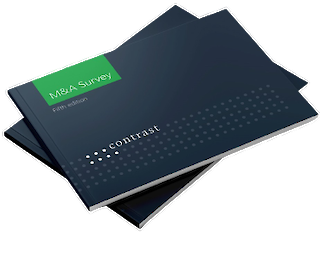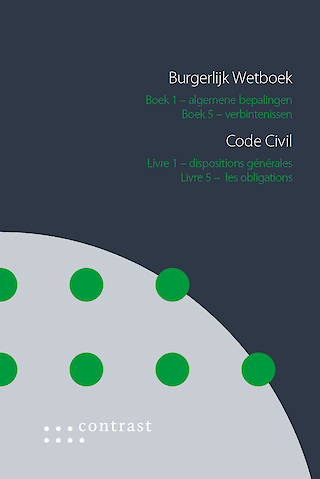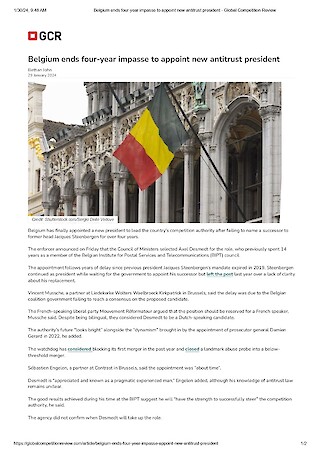In the Picture

State aid, a possible painkiller against the corona financial hangover
May 2020Imagine…
Because of the corona crisis, your company is experiencing financial difficulties.
Your brick-and-mortar stores were obliged to close. The losses this has entailed are by no means offset by online sales of your products. Even if your stores might be allowed to re-open soon, you have few illusions that the customers will be breaking down your doors right away. If this continues, the crisis could have far-reaching consequences for your company …
Via the media you learn that the government is giving financial aid to companies having difficulties due to the corona crisis. Such support would be more than welcome!
However, from an earlier compliance training you recall that the European Commission has to approve any such aid from a national government, that the review process can take a long time, and that this approval is far from being a certainty. Are the corona aid measures really admissible? So can you accept the aid or do you need to watch your step?
A brief clarification.
State aid includes any form of measure where a public authority of an EU Member State grants a selective economic advantage to certain companies, and which distorts, or threatens to distort, competition and trade between the Member States.
In the EU, the basic rule is that State aid is prohibited. There are exceptions, however. For example, aid can escape the prohibition if its amount is below the ceilings set in a so-called de minimis regulation. In addition, in certain cases State aid is ´compatible´ with the internal market and thus authorised. A Member State that wants to grant State aid must either have it approved by the European Commission, or rely on an exemption regulation or decision of the Commission. In that event, the aid measure does not have to be notified.
The EU Member States therefore have several instruments for granting aid to companies that are experiencing difficulties as a result of the corona crisis.
- Member States may take measures that are not State aid, because they are not granted to companies, but rather to private individuals (for example, a deferment of personal income tax) or because they are general measures entailing no selective advantage for specific companies (for example, the attribution of a general deferment for the payment of the employer social security contributions).
- Member States may grant State aid if it meets the conditions of a de minimis regulation or of an exemption regulation or decision of the European Commission. In this case, there is no prior notification required.
- Member States may grant aid that serves to make good the damage caused by "natural disasters or exceptional occurrences" (article 107(2)(b) TFEU). The European Commission has recognised the corona crisis as being such an “exceptional occurrence”. This means that Member States can, subject to notification to and approval by the European Commission, grant financial aid to companies that suffer harm due to the corona crisis. This is above all useful for supporting companies that have been particularly hard hit by the crisis, such as those in the tourism or aviation sectors.
- Member States may also grant aid that serves "to remedy a serious disturbance in the economy of a Member State" (article 107(3)(b) TFEU). The European Commission has confirmed that the corona crisis constitutes just such a “serious disturbance”. The Commission is assessing notifications of such aid on the basis of a Temporary Framework which it adopted as a result of the crisis. This possibility is by far the most frequently used by Member States, for example to grant public guarantees to companies in difficulty.
All of these instruments are being frequently applied in order to try to protect companies against the malign effects of the corona crisis. Moreover, the European Commission is acting with unusual speed, approving a majority of the notified aid measures within 24 to 48 hours.
So, it is possible that your company as well qualifies for State aid. In any event, however, it is always wise to verify for yourself whether the aid is lawful since it falls within a Member State’s policy discretion or was approved by the European Commission. Otherwise, according to well-established case-law, in principle you cannot argue that the authority’s conduct gave rise to a legitimate expectation that the aid was lawful, and you run the risk of later having to reimburse the aid received.
Concretely:
- State aid rules offer EU Member States several instruments for granting assistance to companies experiencing difficulties as a result of the corona crisis.
- The European Commission is processing notified State aid measures at a record pace, with a majority of the measures being approved within 24 to 48 hours.
- If your company is suffering hardship due to the corona crisis, it might qualify for aid from the public authority.
- To avoid any risk, however, it is always advisable to verify for yourself that the aid measure is indeed lawful.
Want to know more?
- The European Commission is assembling all of the information concerning State aid rules and the coronavirus on this page. This includes an overview of the relevant decisions.
- The Temporary Framework of the European Commission of 19 March 2020, as amended on 3 April 2020 and 8 May 2020, can be consulted via this link.
- In July 2016, the European Commission adopted a Notice on the notion of State aid, which is available via this link.











